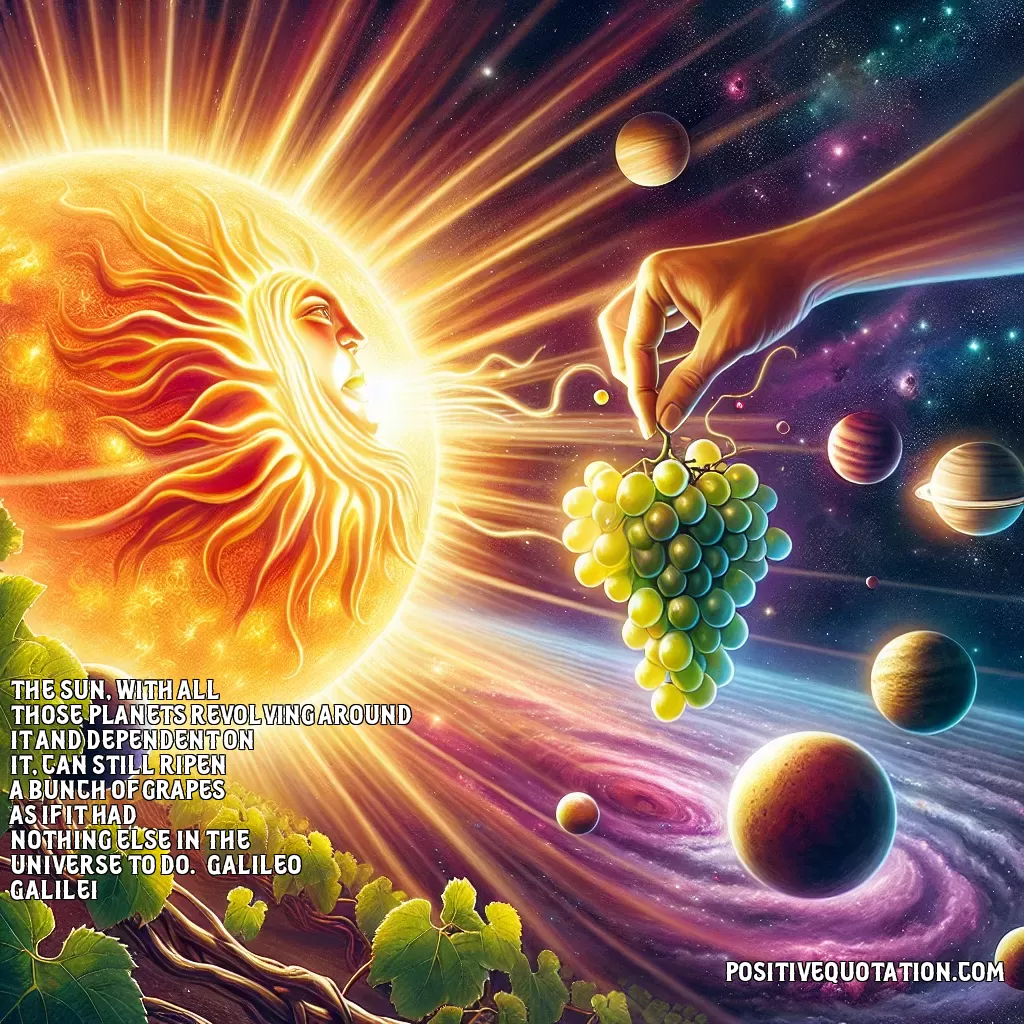
The sun, with all those planets revolving around it and dependent on it, can still ripen a bunch of grapes as if it had nothing else in the universe to do. Galileo Galilei

The sun, with all those planets revolving around it and dependent on it, can still ripen a bunch of grapes as if it had nothing else in the universe to do. Galileo Galilei
This profound quote by Galileo Galilei encapsulates the idea of focused purpose amidst vast responsibilities. The sun, a colossal and powerful entity at the center of our solar system, symbolizes an unparalleled source of energy and life. It orchestrates the intricate dance of planets, moons, and other celestial bodies that are bound by gravity and dependent on its presence for their existence. However, despite the monumental nature of these duties, the sun's ability to ripen a bunch of grapes illustrates a stunning capacity for singularity of focus and functionality. Galileo’s metaphor encourages us to consider the nature of greatness and the importance of being present in the moment. The sun, while sustaining an entire cosmic system, still performs the simple yet vital task of nurturing a small cluster of grapes. This suggests that true power lies not in being overwhelmed by responsibilities, but in the ability to channel one's energy towards nurturing small but vital aspects of life. This quote resonates on personal and philosophical levels, reminding us of the significance of attention and care in everyday tasks. Just as the sun effortlessly nurtures the grapes, we too can strive to find balance between our broader responsibilities and the smaller, yet important details of our lives that require our care and focus. Thus, Galileo articulates a key principle of existence: that in the cosmic vastness of responsibilities, there is always room for nurturing the individual elements that enrich our lives.
Quote By: Galileo Galilei
Galileo Galilei, often referred to as the "father of modern science," was born on February 15, 1564, in Pisa, Italy. His contributions to physics, astronomy, and the scientific method have left an indelible mark on the history of science. Galileo's early education began at the University of Pisa, where he initially studied medicine but quickly shifted his focus to mathematics and natural philosophy. His keen observational skills and innovative approach to experimentation laid the groundwork for many scientific disciplines.
In 1609, inspired by reports of a new telescope invented in the Netherlands, Galileo constructed his own improved version. Using this instrument, he made groundbreaking astronomical observations, including the discovery of Jupiter's four largest moons, which he famously named the Galilean moons: Io, Europa, Ganymede, and Callisto. This revelation not only challenged the then-prevailing geocentric model of the universe, which held that Earth was the center of planetary motion, but also provided strong support for the heliocentric theory proposed by Copernicus. Galileo's book, *Sidereus Nuncius*, published in 1610, detailed his findings and forever changed humanity's view of the cosmos.
Galileo Galilei's pursuit of truth, however, soon put him at odds with the Catholic Church. His advocacy for the heliocentric theory and his insistence on relying on observation and experimentation as the basis for scientific inquiry were met with resistance from religious authorities. In 1616, the Church formally prohibited the teaching of heliocentrism, and Galileo was later tried by the Roman Inquisition in 1633. He was found "vehemently suspect of heresy" and sentenced to house arrest, where he continued to work on his scientific writings, notably *Dialogue Concerning the Two Chief World Systems*, which defended the Copernican method while still maintaining a level of caution towards Church doctrine.
Galileo Galilei passed away on January 8, 1642, but his legacy endures. He is remembered not only for his discoveries and inventions, such as the improvements to the telescope and the development of the scientific method, but also for his unwavering commitment to intellectual freedom. His courage to challenge established beliefs laid the foundation for modern scientific thought and continues to inspire generations of scientists.